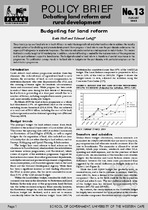| dc.contributor.author | Hall, Ruth | |
| dc.contributor.author | Lahiff, Edward | |
| dc.date.accessioned | 2019-02-21T13:12:54Z | |
| dc.date.available | 2019-02-21T13:12:54Z | |
| dc.date.issued | 2004 | |
| dc.identifier.citation | Hall, R. et al. (2004). Budgeting for land reform. Policy Brief 13, Bellville: Institute for Poverty, Land and Agrarian Studies, University of the Western Cape | en_US |
| dc.identifier.uri | http://hdl.handle.net/10566/4260 | |
| dc.description.abstract | The primary purpose of land reform in South Africa is to redistribute agricultural and other land in order to address the racially
skewed pattern of landholding and promote development. Slow progress in land reform over the past decade underscores the
urgency of finding ways to accelerate the process. The state has adopted a market-assisted approach to redistribution. This means
that land is usually bought at full market price. In addition, substantial funding is needed for the implementation of the programme
and for post-settlement support to beneficiaries. The budget allocated to land reform is therefore of central importance to the
programme. This publication surveys trends in the land reform budget over the past decade, with particular emphasis on the
redistribution programme. | en_US |
| dc.language.iso | en | en_US |
| dc.publisher | Institute for Poverty, Land and Agrarian Studies, University of the Western Cape | en_US |
| dc.relation.ispartofseries | Policy Brief: Debating land reform and rural development; | |
| dc.subject | Transfers and subsidies | en_US |
| dc.subject | Budget trends | en_US |
| dc.subject | Land reform | en_US |
| dc.subject | South Africa | en_US |
| dc.subject | Budgeting | en_US |
| dc.title | Budgeting for land reform | en_US |
| dc.type | Other | en_US |

